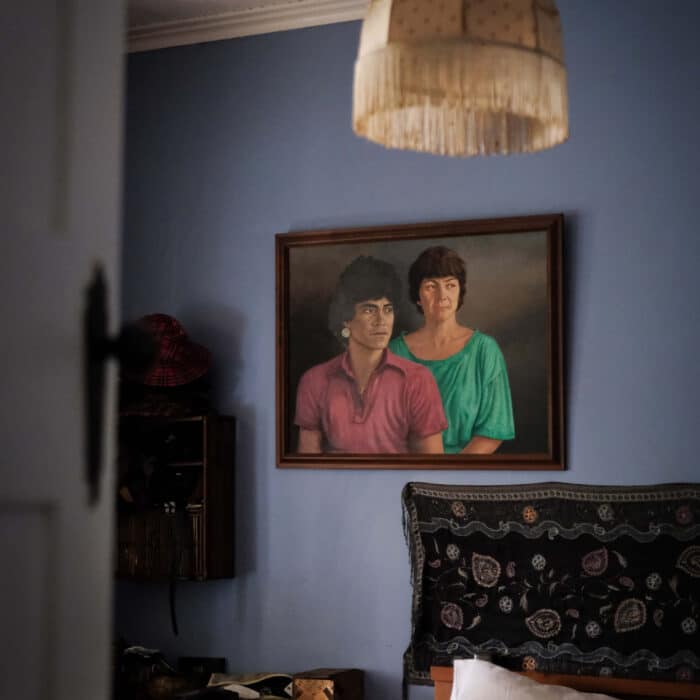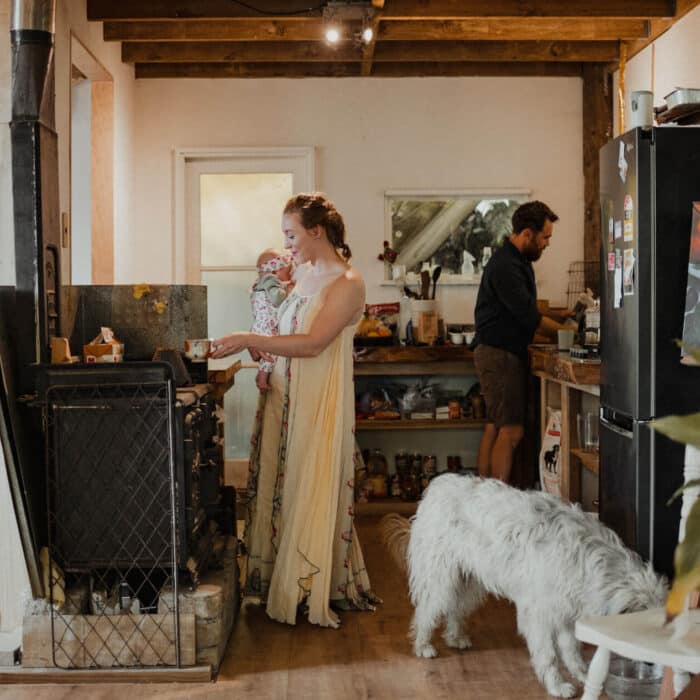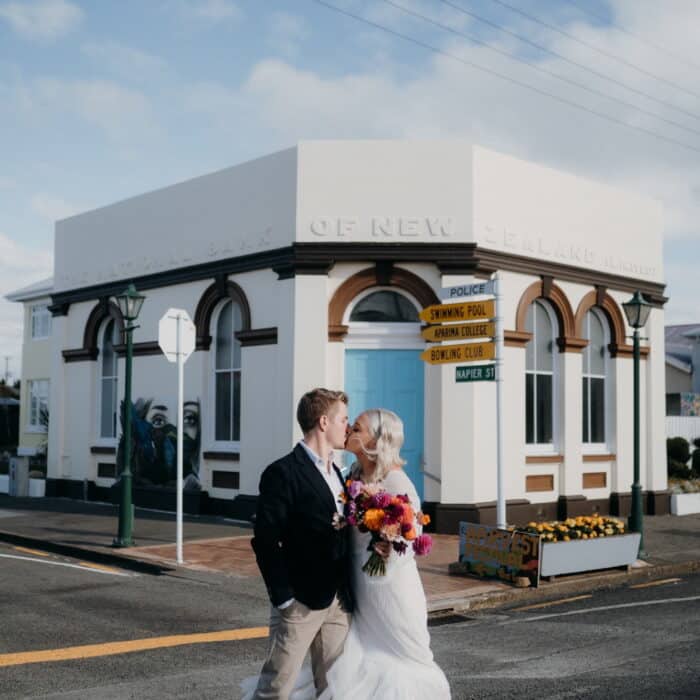11 September 2022
Giving Back
WRITER: JESSICA DERMODY
PHOTOGRAPHER: ANNA BROOK
Volunteering is the giving of yourself – your time and talent – to a valuable cause, whatever it may be. For many women across Aotearoa, including Judy, Alice and Joanne it means recognising the power of connection and choosing to step up in their local communities.

Judy with the smithy's youngest volunteer, Breana Smith. "It's magic watching the young kids getting enthused."
Judy Waterson
Nicol's Blacksmith Shop
Blacksmithing has long been an integral part of society - crafting with fire to create metal objects for everything from rail line repairs to shoeing a horse. Though much of the skill has been left behind, with blacksmiths few and far between, nestled among snow-capped mountain ranges and the lazy Waitaki River, you'll find Judy Waterston firing up the forge and pumping the bellows at the historic Nicol's Blacksmith Shop in Duntroon.

"It's a magic building, the hotspot of Duntroon back in its day - everything was made and repaired there," Judy says of the smithy, which was once the epicentre of the small agricultural town. She's part of a collective of Duntroon locals preserving the smithing trade, and the historic building the forge is located in. The area's rich history is what originally ignited Judy's passion for blacksmithing. "I've always admired the bellows, the anvil and the history of smithing in New Zealand, especially the gold-mining history in Central Otago."
The building has been through varying states of restoration. After being left in ruins, it was bought by a group of local farmers in 1975, who rallied to stop it from being bulldozed. A few years later, Judy set up a dainty arts and crafts store in the front of the building. "I wanted people to stop and see a blacksmith shop in its original condition, with all the tools and the dirt floor. But that didn't really work out."
In 2006, the wood-clad building was put into a community trust, unlocking much-needed funding. With community backing, it took on a new lease of life in the form of Nicol's Blacksmith Shop - homage to Nicol Muirden, the last known working blacksmith in the area, who retired in 1966. "We had a public meeting to figure out what to do with it. There was enough enthusiasm there to open it up one day a week. We started forging and it was just magic," says Judy. The revival of Nicol's Blacksmith Shop - along with the cafe next door supplying travellers with much-needed coffee - brought an influx of visitors to the small North Otago town. That was, of course, until Covid-19 hit.
From floods to the gold rush, the village could tell many stories. Judy says the area went relatively underappreciated for a number of years, partially due to the State Highway, which allows for faster travel but removes the need to stop.
A silver lining from the lack of tourists was the increase in appreciation from locals. "We get lots of people come in and say they've been living around the area for so many years, but they wish they'd come in earlier! So that's really neat." When someone buys something, Judy says they're buying a piece that's been made "by all of us."
From floods to the gold rush, the village could tell many stories. Judy says the area went relatively underappreciated for a number of years, partially due to the State Highway, which allows for faster travel but removes the need to stop.

"Physically, it's hard work, you're pumping the bellows and striking the metal. I'm pretty exhausted at the end of the day, but I always drive home with a big grin on my face."
A passionate group of volunteers - Judy included - fires up the forge once or twice a week. Training courses and kids' programmes led by the group are the main joy for Judy. "You want to see the light in the kids' eyes when they hit or bend a piece of metal. The flames! The kids just love fire and find it amazing that they can do that," she says. With more kids finding entertainment inside or online, it's a "magical" experience to see kids try their hand at blacksmithing. "They all want to make swords or knives. They aren't that easy to make, but I still try to foster their passion anyway," she says with a laugh.
With many in the Nicol's volunteer base around seventy or eighty years old, some are starting to slow down, though not before passing on their wealth of knowledge. Judy will often go down and supervise while younger volunteers have a crack - mostly school kids whose interest was sparked after going through one of the group courses. One young girl has now started taking requests on what to make from her family. "You only have to inspire one person to come back," says Judy.
At sixty-eight, Judy herself is thinking about retirement, but won't be leaving smithing completely. "I'll still carry on for years, I'm sure. Physically, it's hard work - you're pumping the bellows and striking the metal. I'm pretty exhausted at the end of the day, but I always drive home with a big grin on my face."
It's the locals' passion that keeps this small community banded together. There's an annual working bee to keep the wooden building in order, including spraying the original dirt floor to keep the swirls of dust to a minimum. It's also a chance to catch up with everyone, as working on a roster means not all volunteers cross paths. "We have a barbecue, and it's lovely to hear everyone chatting about what they've made and how they do it. For me that's just special," she says. And her advice for others thinking of giving blacksmithing a go? "You only have to start and all of a sudden you get caught up in the alchemy of turning metal into something useful."
"We need to acknowledge our history and to me that's the building, its history and blacksmithing. It's such an important part of life throughout the ages."
Alice Read
Good Bitches Baking
While scrolling on Facebook, a picture of yummy treats posted by one of her friends led Alice Read to the proverbial oven door of Good Bitches Baking (GBB). Founded in 2014 "over a glass of bubbles," volunteers across GBB's twenty-nine chapters nationwide donate baking to those going through tough times. Realising GBB didn't have a chapter in her Te Oha-a-Maru Oamaru community, Alice set about bringing sweetness to those in need as her community's "Head Bitch."

"We had one organisation we deliver to tell us that a mother who received our baking said the parcel of goodies was 'like having a mum who loves you.'"
"It's amazing, isn't it! I don't think anyone gets offended by the name," Alice, 63, says with a laugh. While the moniker may not align with the typical charity name, it's certainly one with a clear message. "The ethos behind Good Bitches is to bring a bit of sweetness to people who are having a hard time. That's the bottom line, the bare bones of what we do," she says.
Alice began organising the Oamaru chapter of GBB just before the first Covid-19 lockdown. She says New Zealand coming to a standstill in 2020 "gave me time to get organised and wrangle in a few people." Several years later, that few is more like twelve volunteers, six recipient organisations and eleven boxes of baking delivered a fortnight. Alice's bakers all come with their own story, whether it be finding the charity online like Alice, or through word of mouth from friends that bake in other areas.
Metaphorically, the Oamaru chapter being born during lockdown couldn't be more telling about the importance of human contact. That lesson is where Alice draws her inspiration. "Service is about connection," she says. "Nobody deserves to be isolated. Showing support and kindness in a practical way is a really rewarding process for everybody. Not only does the recipient feel the love, but so too does the baker."

That love from Alice and her fellow bakers goes far beyond the fact they all volunteer their time and pay for any ingredients out of their own pockets. Every batch is tailor-made to the needs of the organisation and recipients. Alice says families may like "big batches of biscuits or slices" - perfect for lunch boxes - while boxes supplied to the Cancer Society, which delivers to patients going through treatment, go to people who often don't want sweet things. "So they will receive something more savoury, it's very personal," says Alice. "I ran into someone recently and they told me we're making such a difference in people's lives. They described our baking as a foot in the door to getting people's faith in the goodness and kindness of others restored, with no strings attached. That really spoke to me of the ripple effect of a small gesture, and the impact it can have."
A spread of Alice's baking to donate. "It's great to bake for everybody, but this is specifically for those that need a bit of sweetness in their lives, to help them to get through their day."
Joanne Rae
Molyneux Mail
When the Millers Flat School newsletter became a bit of a hassle for the small school in 1985, the idea of carrying it on was put to the locals at a public meeting, and thus the Molyneux Mail was born. Joanne Rae was one of the people who offered her typing skills at that meeting, and is still doing her part to keep the community connected to this day.


A firm belief in everyone pulling together is what prompted Joanne to first offer her typing skills to the Molyneux Mail in the eighties. Now, as co-editor, Joanne is a cog in a wheel of production that encompasses everyone from her neighbours to the local fire station. "If everyone contributes then things happen, don't they? I think Millers Flat is one of those special places where if anything needs doing, it just gets done. It all just falls together," says Joanne, who's in her early sixties. "I married a local and have only been at Millers Flat for forty- three years," she laughs.
From stories written by local school kids to important dates sent in by Rural Women New Zealand, or a reminder when it's time to collect your pool key, the Molyneux Mail has long been a lifeline for those living in Teviot Valley. The Mail charges community businesses $2 for an ad, or $5 if you're from outside the Valley. "We're not going to make a fortune, but it is surprising how it ticks over. It's been that way for the last ten years or more," says Joanne. The group of six volunteers have created a self-contained, well-oiled machine to pay the one bill due a year - when Joanne buys the paper to print it on - and make sure everyone receives the Mail on time.
The many hands the Mail passes through before it arrives in mailboxes is a testament to the community effort behind the scenes, and Joanne says it's just what is required to keep smaller towns ticking over. "My kids come back for a holiday and they will always get roped into a working bee or something like that. They expect it now." Volunteers take turns at typing the weekly, A4 double-sided newsletter.
Originally it was typed out on special paper so that the Gestetner - a duplicating machine housed in another local's garage - could make copies when someone cranked the handle. "We've gradually improved our process over the years through fundraising," says Joanne. With the help of a friend who works at a commercial printing company, Joanne struck a deal to upgrade the group's photocopying machine every few years. "The fire station chief is a good friend, so the photocopier is in his office at the fire station. Every week I toddle around to the station to print it off," she says. "The rural delivery guy picks up the 220 copies I leave at the fire station's neighbours."
These mailboxes are for everyone in Millers Flat township. No one gets the post sent to their house. The boxes are situated outside of Faigan's Cafe, and a big ritual for locals is to go down to get their mail and then go into the cafe to have a yarn.
"If everyone contributes then things happen, don't they? I think Millers Flat is one of those special places where if anything needs doing, it just gets done. It all just falls together."
Delivered to locals and businesses all around Raes Junction and the houses up to Roxburgh on both sides of the Clutha River, it's also emailed to many locals who now live overseas. Over 300 copies a week land in mailboxes, physical or virtual, all with the aim of keeping people connected. "It's a good way for people to keep in touch. We've had people ring and say, 'Don't forget to send me a copy!' after they've moved away."


The Mail is much more than a newsletter. In an age of increasing technology, emails and Zoom meetings, those behind the Molyneux Mail are doing the important job of keeping their senior community, in particular, in the loop. It's helping those who are more vulnerable in her town that keeps Joanne typing away, week after week. "It's like a relic of times gone by," she says. "When you've got a lot of older people in the community that aren't computer savvy, it's their way of keeping in touch."
As Millers Flat slowly joins the rest of Central Otago in becoming a holiday hotspot, Joanne says it's important for those who still live there full time to stay connected, and the Mail helps spread the word about events. Every Thursday morning at Faigan's Cafe, for example, everyone - from locals to those that own a crib - is welcome to meet for a community morning tea. Some travel from as far as Mosgiel - 150 kilometres away - to join. "About thirty people go. They may only be there for an hour or so, but if they can find someone to talk to about something, it's so important. If we didn't have the Mail, people wouldn't know that was going on," she says.
Top. Well into the gold-mining era, Molyneux was a whalers' and settlers' name for the Clutha River. Above. The volunteer-run fire station where the Mail is printed.

This story is part of THREAD, a year-long project by Shepherdess made possible thanks to the Public Interest Journalism Fund through NZ On Air.
If you enjoyed this story, please share with someone else.
This story appeared in the Kōanga Spring 2022 Edition of Shepherdess.
Get your hands on a copy.
Related Stories
On My Wall, Kōanga Spring 2023
The artist Mike Worrall lived, as my husband Pat and I did, on Waiheke Island in the seventies. Pat’s idea: we would commission a portrait.
Party Planning
Southland couple Ali and Nick Woods threw a surprise wedding party disguised as a joint birthday bash in Aparima Riverton.
By River and Road
Natalie, 33, never intended to stay in Whanganui when she first moved to the area five years ago.



